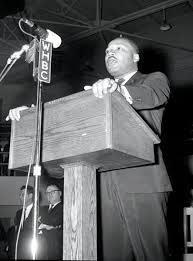Charita Goshay: We only love some people when they're dead
- Oops!Something went wrong.Please try again later.

On Monday, the nation will celebrate one of its greatest Americans.
In January 1929, America was on the precipice of economic free fall. Millions of people had no idea they would end the year entrapped in what would become the Great Depression, rendering many of them unemployed, even homeless.
With nothing to lose, the Great Migration sputtered to life, as millions of Black Americans began to flee the Jim Crow South, though segregation, lynching, and "sundown" towns were part of the cultural fabric everywhere.
This is the America to which the Rev. Martin Luther King Jr. was born and would grow up to change forever.
At the time of his death, the majority of Americans held an unfavorable view of King and his mission, and let's be clear: It was a mission. Calling America to abandon hatred and embrace justice is as old and inspired as the scriptures.
There's a quirk in humans in that we lionize and have kind things to say about certain people only after they are dead. We erect statues and re-christen streets and schools and bridges in their memory, but truth be told, we don't like prophets — we don't.
More Charita: Election audit confirms what we already knew
More Charita: Jan. 6 offers a former president a presidential moment
According to Gallup News Service: "In 1963, King had a 41% positive and a 37% negative rating; in 1964, it was 43% positive and 39% negative; in 1965, his rating was 45% positive and 45% negative; and in 1966 — the last Gallup measure of King using this scalometer procedure — it was 32% positive and 63% negative."
King's numbers were such because prophets are not popular people. They shine light into dark places and tell us that which we already know about ourselves but would prefer to ignore.
On March 24, 1964, King spoke at the Memorial Fieldhouse in Canton at the invitation of the late Rev. Sheridan Lancaster, pastor of St. Paul AME Church, where he declared, "I still have faith in the future," and telling the crowd of 3,500: "All life is interrelated in today's world. I can't be what I ought to be until you are what you ought to be; and you can't be what you ought to be 'til I am what I ought to be."
In 2018, a historic marker was placed outside the Fieldhouse commemorating the event.
True prophets make us uncomfortable by calling out our hypocrisies and rejecting the status quo. History is pockmarked with the deaths of people who were martyred because they were compelled to tell those in power precisely what they did not want to hear.
When King called on America to live up to its public declaration that "all men are created equal," he was flayed as a communist and troublemaker for espousing the radical idea that if this nation is to endure, love is the only means by which that can be accomplished.
In short, love is more than emotion. It is a conscious choice to embrace the fundamental premise that all human beings are equal, and that we must treat them as such.
It isn't a coincidence therefore that many people only quote the soaring, poetic end of "I Have a Dream," rather than its squirm-inducing beginning in which King accuses America of writing a bum check to its Black citizens.
Prophets who preach such things put themselves at risk because they threaten those who most benefit from inequity and injustice in a house divided.
There are some who have styled themselves as prophets, understanding that people are fascinated by such things, but they prove themselves to be anything but by their public embrace and defense of the powerful, the corrupt and the connected.
They thrill at the thought of being inside the tent, looking out, rather than telling the truth.
No one is defending King's sins, which are well-documented and often are used as a means to mute his voice. There are no flawless people. As the brilliant Leonard Cohen once wrote:
But the voice of America's prophet and his call for a more just nation has not diminished.
It still rings clear and true.
Charita M. Goshay is a Canton Repository staff writer and a member of the editorial board. Reach her at 330-580-8313 or charita.goshay@cantonrep.com. On Twitter: @cgoshayREP
This article originally appeared on The Repository: Charita Goshay: Martin Luther King Jr. is America's prophet
